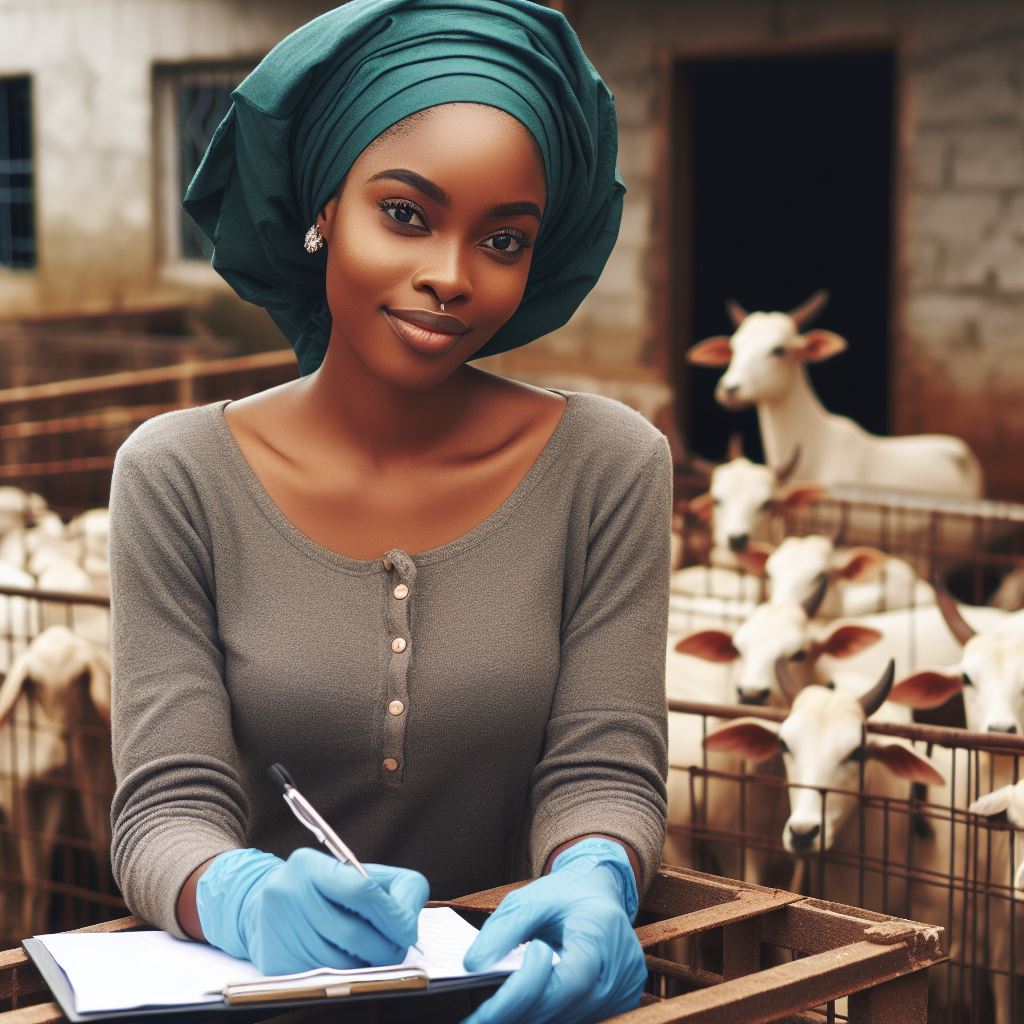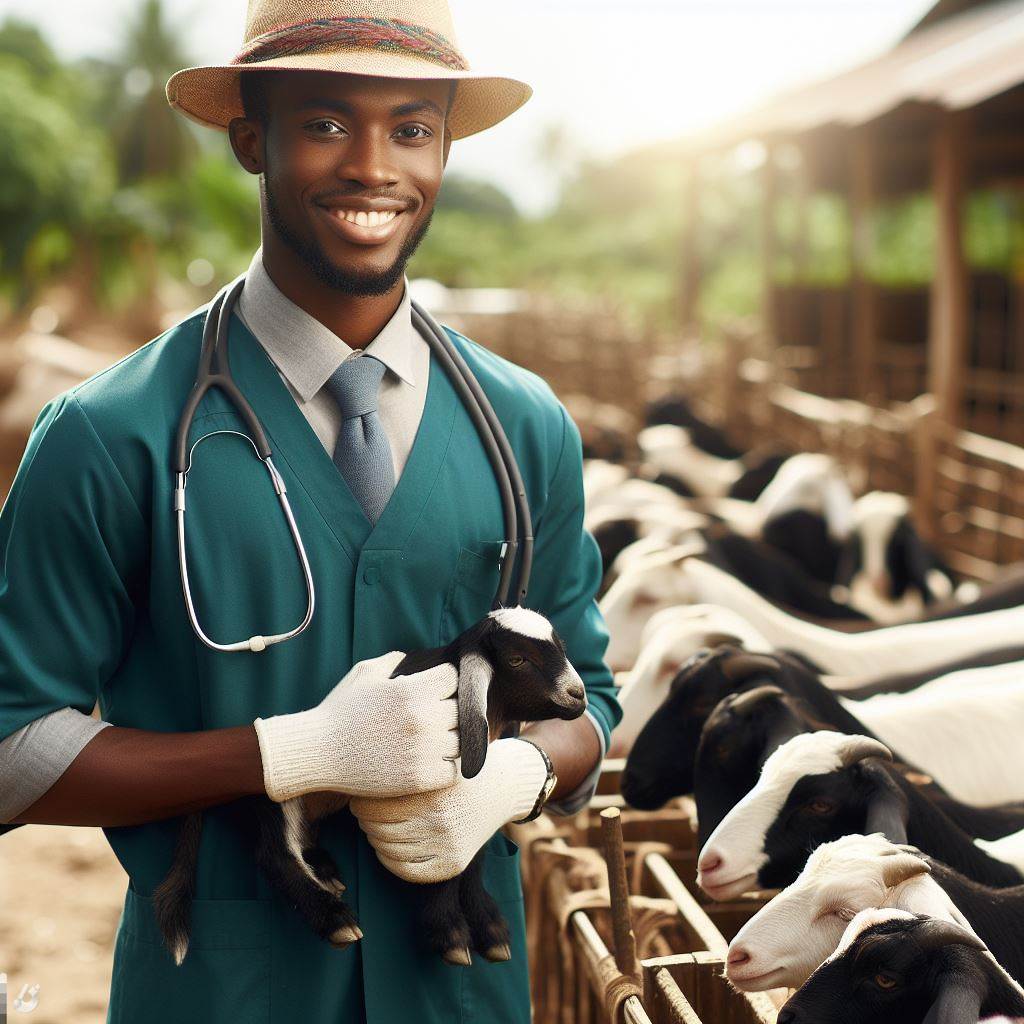Introduction
Animal production courses in Nigerian universities play a crucial role in the agricultural sector by providing specialized training.
These courses are important as they equip students with the necessary skills and knowledge to contribute to the development of animal husbandry in Nigeria.
With a population heavily reliant on agriculture, animal production has a significant impact on the country’s economy and food security.
By offering courses in this field, universities aim to address the specific challenges faced in livestock management, breeding, nutrition, and disease control.
These courses also focus on improving animal productivity, promoting sustainable practices, and enhancing the welfare of livestock.
Students who pursue animal production courses gain expertise in areas such as animal genetics, reproductive technologies, feed formulation, and farm management.
The knowledge gained is crucial in addressing the diverse needs of Nigerian farmers, advancing research and innovation, and ensuring efficient and profitable livestock production.
Additionally, these courses contribute to the overall development of the agricultural sector by producing competent graduates who can actively participate in policy formulation and implementation related to animal production.
Overall, animal production courses in Nigerian universities are vital in meeting the demand for skilled professionals in the field and fostering sustainable agricultural practices for the country’s economic growth and food security.
Overview of Animal Production Courses
In Nigerian universities, animal production courses are offered at various levels of education including undergraduate and postgraduate programs.
These courses provide students with a comprehensive understanding of livestock production and management.
Undergraduate Courses
- Bachelor of Agriculture in Animal Science: This program focuses on the fundamentals of animal production, nutrition, breeding, and health management.
- Bachelor of Agriculture in Animal Production and Health: This course covers topics in animal genetics, reproduction, behavior, and welfare.
- Bachelor of Science in Animal Science: This degree program emphasizes livestock production systems, animal nutrition, and meat science.
These undergraduate courses typically span four to five years and include practical training in animal husbandry, farm management, and veterinary skills.
Postgraduate Programs
- Master of Science in Animal Science: This program offers advanced studies in areas like animal breeding, molecular genetics, and livestock management.
- Master of Agriculture in Animal Production and Health: Postgraduates gain expertise in animal physiology, reproduction technologies, and disease control.
- Doctor of Philosophy in Animal Science: This doctoral program allows for specialized research in animal genetics, nutrition, or livestock production systems.
Postgraduate programs often involve research projects, thesis writing, and teaching assistantships, enabling students to contribute to the advancement of animal production knowledge.
Specializations in Animal Production
- Animal Breeding and Genetics: Students learn about genetic improvement techniques, selection strategies, and quantitative genetics.
- Animal Nutrition and Feed Technology: This specialization focuses on animal diet formulation, feed production techniques, and nutritional requirements.
- Livestock Production and Management: Students gain knowledge in areas like farm planning, animal welfare, and sustainable livestock production.
- Animal Health and Disease Control: This specialization covers topics in veterinary medicine, disease prevention, and vaccine development.
- Poultry Science: Students explore various aspects of poultry production, including breeding, nutrition, housing, and disease management.
These specializations allow students to focus on specific areas of interest within the field of animal production, preparing them for specialized careers.
In short, Nigerian universities offer a wide range of animal production courses at undergraduate and postgraduate levels.
These courses provide students with the necessary knowledge and skills to excel in various aspects of livestock management and contribute to the growth of the agricultural sector in Nigeria.
Read: Emerging Research Areas in Animal Physiology within Nigeria
Undergraduate Animal Production Courses
Core Courses Offered in Undergraduate Programs
- Anatomy and Physiology of Farm Animals: Understanding the structure and functions of animal body systems.
- Animal Nutrition: Learning about the different nutritional needs of animals and feed formulation.
- Animal Breeding and Genetics: Studying the principles of breeding and genetic improvement of animals.
- Animal Health and Disease: Exploring the prevention, diagnosis, and treatment of animal diseases.
- Animal Production Systems: Understanding the management and operation of animal production systems.
- Animal Reproductive Physiology: Studying the reproductive processes and technologies for animal breeding.
- Animal Welfare and Behavior: Examining the ethical considerations and behavioral aspects of animal production.
- Animal Farm Management: Learning about the administrative and managerial aspects of animal farms.
- Biotechnology in Animal Production: Understanding the application of biotechnology in improving animal production.
- Principles of Livestock Economics: Studying the economic aspects and principles of livestock production.
Practical Components of These Courses
The undergraduate animal production courses provide practical training in various ways:
- Hands-on Training: Students engage in practical activities such as animal handling, feeding, and health checks.
- Fieldwork: Students visit livestock farms to gain practical experience in different animal production systems.
- Laboratory Work: Students conduct experiments on animal genetics, nutrition, and reproductive physiology.
- Internships: Students have the opportunity to work in real-life animal production settings during their studies.
- Research Projects: Students undertake research projects related to animal production under faculty supervision.
Duration of Undergraduate Programs in Animal Production
The undergraduate programs in animal production typically last for a duration of four years.
In general, undergraduate animal production programs in Nigerian universities offer a comprehensive curriculum that covers various core courses.
These courses provide students with theoretical knowledge and practical skills necessary for animal production.
The hands-on training, fieldwork, and practical components of these courses enhance students’ understanding and prepare them for real-life situations in animal production.
With a duration of four years, these programs equip students with the competencies required to contribute to the development of the animal production sector in Nigeria.
Read: Animal Physiology Internships and Training Opportunities in Nigeria
Postgraduate Animal Production Courses
In Nigerian universities, there are several postgraduate programs available in animal production.
These courses focus on advanced research and specialized knowledge in the field.
Masters in Animal Production
The Masters in Animal Production program provides in-depth knowledge and training in various aspects of animal production.
Students learn advanced techniques in animal breeding, nutrition, health management, and farm management.
Research focus areas include genetic improvement in livestock, feed formulation, animal reproduction, and disease prevention.
Completing a Masters in Animal Production opens up opportunities for higher-level roles in animal production, academia, and research institutions.
Graduates can also pursue further studies by enrolling in a Ph.D. program in animal production.
Ph.D. in Animal Production
A Ph.D. in Animal Production program focuses on advanced research and development in the field.
Students undertake extensive research projects related to animal nutrition, genetics, reproduction, and farm management.
The research focus often includes areas such as sustainable livestock production, animal welfare, and food security.
Ph.D. candidates work closely with faculty members and industry experts to contribute to the knowledge base in animal production.
Graduates with a Ph.D. in Animal Production can pursue careers in academia, research institutions, and government organizations.
Benefits of Pursuing a Postgraduate Degree in Animal Production
- Specialized Knowledge: Postgraduate courses provide students with specialized knowledge and expertise in animal production.
- Advanced Research Skills: Pursuing a postgraduate degree develops advanced research skills, including experimental design and data analysis.
- Career Opportunities: Graduates with a postgraduate degree have access to a wider range of career opportunities in the animal production industry.
- Leadership Roles: Postgraduate qualifications prepare individuals for leadership roles within organizations and research institutions.
- Contribution to Industry: Postgraduate research contributes to the development of innovative practices in animal production, benefiting the industry as a whole.
In summary, postgraduate programs in animal production offered by Nigerian universities provide opportunities for students to specialize in various areas of the field.
These programs enable students to gain specialized knowledge, develop advanced research skills, and pursue rewarding careers in academia, research institutions, and industry.
Graduates of these programs have the potential to contribute to the advancement of animal production practices and enhance the sustainability of the industry in Nigeria.
Read: Challenges and Triumphs of Architectural Tech Studies in Nigeria
Transform Your Career with Expert Guidance
Get personalized mentorship consulting that’s tailored to your unique path. Our expert advice is actionable and exclusive.
Get Started
Career Opportunities in Animal Production
In the field of animal production, there are various career paths available for individuals who are passionate about working with animals.
These career opportunities offer job prospects and potential salaries that make this field attractive to many.
Job prospects and potential salaries
Animal Farm Manager
- Responsible for overseeing the daily operations and management of animal farms.
- Ensure the health and welfare of the animals, as well as their proper feeding and breeding.
- Salary range: ₦600,000 – ₦1,200,000 per annum.
Animal Scientist
- Engage in research to improve animal breeding, nutrition, and production.
- Contribute to the development of more efficient farming practices.
- Salary range: ₦700,000 – ₦1,500,000 per annum.
Veterinary Doctor
- Provide medical care, treatment, and surgery to animals.
- Diagnose and prevent diseases, ensuring the health of livestock and pets.
- Salary range: ₦800,000 – ₦2,000,000 per annum.
Animal Nutritionist
- Formulate balanced diets and feeding programs for various animal species.
- Conduct research to optimize the utilization of feed ingredients.
- Salary range: ₦500,000 – ₦1,000,000 per annum.
Animal Geneticist
- Specialize in genetic improvement and breeding of animals.
- Work to enhance desirable traits in livestock and create superior animal breeds.
- Salary range: ₦600,000 – ₦1,200,000 per annum.
Livestock Extension Officer
- Provide technical support and advice to livestock farmers.
- Help farmers increase productivity, profitability, and sustainability.
- Salary range: ₦400,000 – ₦800,000 per annum.
Poultry Farm Manager
- Manage the operations of poultry farms, ensuring efficient production and quality control.
- Oversee the breeding, hatching, feeding, and marketing of poultry.
- Salary range: ₦600,000 – ₦1,200,000 per annum.
Importance of animal production in Nigeria’s economy
The field of animal production plays a crucial role in Nigeria’s economy. Here are some reasons why:
- Food Security: Animal production provides a significant contribution to Nigeria’s food security. Livestock products such as meat, milk, and eggs are essential sources of protein for the population.
- Employment Generation: The animal production sector creates numerous employment opportunities, contributing to poverty reduction and economic development.
- Foreign Exchange: Nigeria has the potential to export livestock and livestock products, earning foreign exchange for the country.
- Rural Development: The development of animal production in rural areas can help alleviate poverty and improve the living standards of rural communities.
- Economic Stability: Animal production provides a stable source of income for farmers and contributes to the overall stability of the agricultural sector.
In review, pursuing a career in animal production offers diverse opportunities with competitive salaries.
Moreover, the importance of animal production in Nigeria’s economy cannot be overstated, as it ensures food security, generates employment, and contributes to economic growth and development.
Read: Understanding NUC Standards for Architectural Tech Programs
Challenges and Future Prospects
Challenges faced by animal production courses in Nigerian universities
In spite of the importance of animal production courses in Nigerian universities, they face numerous challenges that hinder their growth and development. These challenges include:
- Lack of modern and well-equipped facilities for teaching and research purposes.
- Inadequate financial resources to support effective teaching, research, and practical experiences.
- Shortage of skilled and experienced faculty members in the field of animal production.
- Inadequate recognition and support from the government and other stakeholders in the agriculture sector.
- Lack of updated and relevant curriculum that aligns with the needs of the industry.
- Insufficient practical training opportunities for students to gain hands-on experience.
- Low interest and enrollment in animal production courses by students due to limited career opportunities.
- Inadequate awareness about the importance and potential of animal production in the country’s economy.
The need for improved facilities and resources
The challenges mentioned above are significant obstacles that hinder the growth and development of animal production courses in Nigerian universities.
However, if these challenges are effectively addressed, there is great potential for growth and development in the field.
Improved facilities and resources are essential for enhancing the quality of education and research in animal production courses.
Upgrading laboratories, research farms, and other infrastructure can improve practical experiences for students and enable them to gain valuable skills.
Additionally, increased funding and financial support are crucial for recruiting competent faculty members, conducting research, and providing scholarships to deserving students.
Adequate financial resources can also facilitate the acquisition of modern equipment and technology for teaching and research purposes.
Potential for growth and development in the field
Furthermore, the field of animal production has immense potential for growth and development in Nigeria.
The country has a large agricultural sector, and animal production plays a vital role in meeting food security needs, generating income, and creating employment opportunities.
With the right investments and support, animal production courses can produce graduates who are equipped with the skills and knowledge needed to contribute to the sustainable development of the agricultural sector in Nigeria.
These graduates can be employed in various fields such as livestock management, animal nutrition, breeding, and agribusiness.
Moreover, the development of innovative practices and technologies in animal production, such as improved breeding techniques, precision nutrition, and disease control, can contribute to increased productivity and profitability in the sector.
This, in turn, can attract more students to enroll in animal production courses and create a positive cycle of growth and development.
In a nutshell, while animal production courses in Nigerian universities face various challenges, there is significant potential for growth and development in the field.
Addressing these challenges by improving facilities, increasing financial support, and raising awareness about the importance of animal production can contribute to the advancement of the agricultural sector and provide promising career opportunities for students.
Conclusion
This blog post has highlighted the importance of animal production courses in Nigerian universities.
These courses provide students with the knowledge and skills needed to contribute to the agricultural sector, specifically in animal agriculture.
Animal production courses equip students with a deep understanding of animal biology, nutrition, health management, and breeding techniques.
These skills are crucial for ensuring sustainable and efficient animal production practices in Nigeria.
By studying animal production, students can make significant contributions to the country’s food security, economic development, and job creation.
They can also promote sustainable farming practices, ensuring the welfare and health of animals.
Overall, animal production courses play a vital role in shaping Nigeria’s agricultural sector, and the need for well-trained professionals in this field is ever-increasing.
To further explore animal production, I encourage readers to consider enrolling in relevant courses in Nigerian universities or conducting research on animal production practices.
By doing so, we can collectively contribute to the growth and advancement of Nigeria’s agriculture industry.




